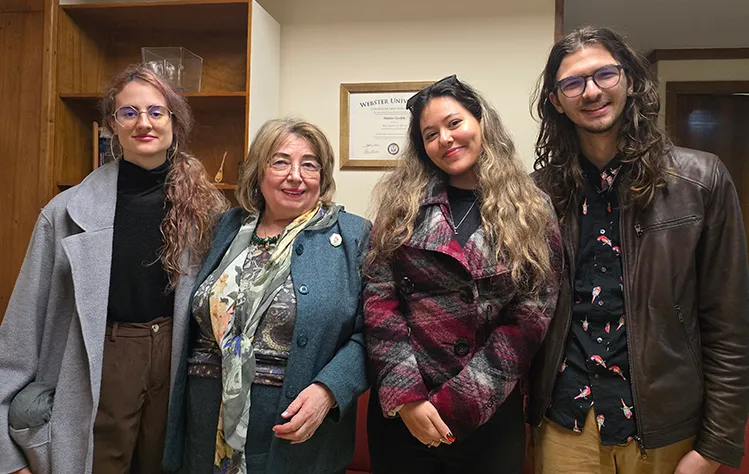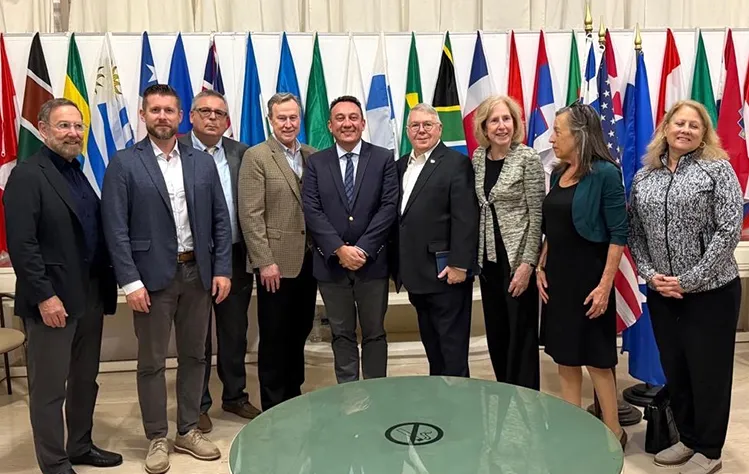Contact the Admissions Office
Call +30 211 999 5309 (office) or email athensadmissions@webster.edu
or Admissions Director, Margarita Lazarou, at margaritalazarou@webster.edu
Programs approved by the Ministry of Education, Research and Religious Affairs of the Hellenic Republic.
Call +30 211 999 5309 (office) or email athensadmissions@webster.edu
or Admissions Director, Margarita Lazarou, at margaritalazarou@webster.edu
Explore the design, delivery and effects of media messages across communication fields and platforms.
Webster University Media Studies majors approach media from academic and practical standpoints, develop diverse professional portfolios and hone skills integral to a variety of media careers. The media studies degree affords an excellent foundation for pursuing a variety of careers within any organization that uses and values communication.

If you love to create and consume media, this media major is broad in scope, giving you wide experience in many media forms. If you ever find yourself thinking about how the media affects our world, then the Media Studies major is for you.
After completing one year of studies, Webster Athens Media Studies students can spend up to a year taking communication courses at the U.S. St. Louis main campus’s School of Communications, which features state-of-the-art media production facilities and equipment, while continuing to benefit from the Athens campus’s lower tuition rates.
Webster University’s School of Communications is home to some of the most advanced communications technology found at any college in the Midwest, offering students access to the same equipment used by many of the top film, video, sound recording and game design companies in the country. The school recently added the first virtual cinema video wall in the region and a state-of-the-art recording studio suite, including a Dolby Atmos studio, to its existing programs and facilities. The School of Communications at Webster University is providing students hands-on training with cutting-edge tools in addition to deep immersion in industry-standard techniques.
[Music]
Text on screen: Webster University
[Footage of the hallway in Sverdrup morphs into a montage of clips from the School of Communications, including a sound board, a student writing on a whiteboard and someone working on a computer.]
Text on screen: School of Communications
[Music fades and continues in the background, with an aerial shot and an exterior shot of the Sverdrup building cutting to an interview shot.]
Eric Rothenbuhler: We are in the west wing of this Sverdrup building that just remodeled as a state-of-the-art media production and communication education facility.
Text on screen: ERIC ROTHENBUHLER Dean, School of Communications
[Footage of a large screen in the soundstage before cutting to another interview shot of Aaron Aubuchon sitting in a theatre seat]
Aaron Aubuchon: We turned it former TV studio into a soundstage. We have a space that we can build things, so now we can actually put sets in that soundstage.
Text on screen: AARON AUBUCHON Associate Dean, School of Communications
We have an LED wall, so we could do virtual cinema production. We have an isolated audio facility. We've also updated some classrooms for gaming and animation.
[Footage of the LED wall, the audio mixing facility and various classrooms for other visual elements.]
[Music fades from the background into full level as there are a montage of clips from the Sverdrup building, including additional facilities and technology. The music fades back into the background as Rothenbuhler begins speaking.]
Rothenbuhler: We may have particular labs optimized for one degree program or another, but between classes the students are sitting next to each other.
[A close-up interview shot of Rothenbuhler.]
They see what each other is doing. They get curious, they start collaborating, and that prepares them for working in the industry.
[Music becomes full volume again with a long, sped up clip of the LED wall, before fading again, and cuts to video games design and a shot of the Interaction Lab.]
With a complete remodeling and a complete tech refresh, we can make a big, big leap forward. So one of the premier examples is our virtual cinema system.
[Music flourishes into full volume as the LED screen of the video wall changes sets and backgrounds directed by students and professors, and the music quiets.]
Caleb Sawyer: The video wall is one of those things that not many places have.
Text on screen: CALEB SAWYER Adjunct Professor of Game Design
[An interview shot of Sawyer in front of the video wall, as he speaks animatedly with big gestures.]
It's no longer preparing them with tools so that they can figure it out in that environment. It's preparing them with experience so that when they get in that environment, they know what they're doing.
[Inspirational music begins as there are multiple shots of Sawyer working with or in front of the video wall. The music fades and the video cuts to Aubuchon.]
Aubuchon: Right now, we have students who know more about how to use these technologies than the professionals in town.
[The music becomes full volume again and there is a shot of sets/backgrounds moving back and forth on the LED video wall.
[A clip of a Sverdrup hallway and the Imaginary World computer lab appear before cutting to another interview shot of Rothenbuhler.]
Rothenbuhler: The School of Communications has always been a leader in all of the things that we do. We're putting high quality professional equipment, some of it cutting-edge, in the hands of every student that joins us. They've got access to top level equipment and really elite education.
[Music swells and ends as the screen fades to black.]
The School of Communications complex houses a professionally outfitted media production and education facility including unique, first-in-the-region technologies and capabilities. No matter what area of communications you pursue, Webster Universities resources are outfitted for success.
Students interested in film, animation, photography, audio engineering and other media will find home for their imaginations in our working soundstage, post-production labs, animation labs and more. Students can also mold their creativity and technical skills in our game design studio or build sets and design worlds in our workshop space. With flexible spaces and the right tools, all you need is to bring your ideas.
Our holistic approach to writing, critical thinking and media means that you’ll have a strong base of skills that can prepare you for many different Media Studies jobs throughout the world. With classes in media literacy, ethics, social media, research and politics, you’ll learn about Media Studies from almost every possible angle.
As you major in Media Studies at Webster Athens, you’ll build the skills and knowledge that can qualify you for jobs, such as:
Your degree could also help if you are:
Successful graduates of this program will be able to:
*Capstone Course: student must earn a grade of no less than B.
Students in the media studies program are encouraged to explore minors, certificates or even other majors to expand their experience.
Students may petition to complete a professional media practicum (internship) or senior overview with a focus in their area of concentration.


Founded in 1915, Webster is an independent nonprofit university with students studying at campus locations in North America, Europe and Asia, and in a robust online learning environment. With its main campus in St. Louis, Missouri, USA, Webster University’s network of faculty, staff, students and alumni forge powerful bonds with each other and their communities around the globe. The University is committed to engaged learning experiences and empowering our students to become catalysts for change. In 2014, Webster Athens joined our network to bring the best of American education with the only fully owned and controlled (academically and financially) accredited campus of a U.S. university in Greece.

December 22, 2025
December 2, 2025
Experts, diplomats and graduate students formed a dynamic conference on Security, Migration and Human Rights in the...

October 30, 2025